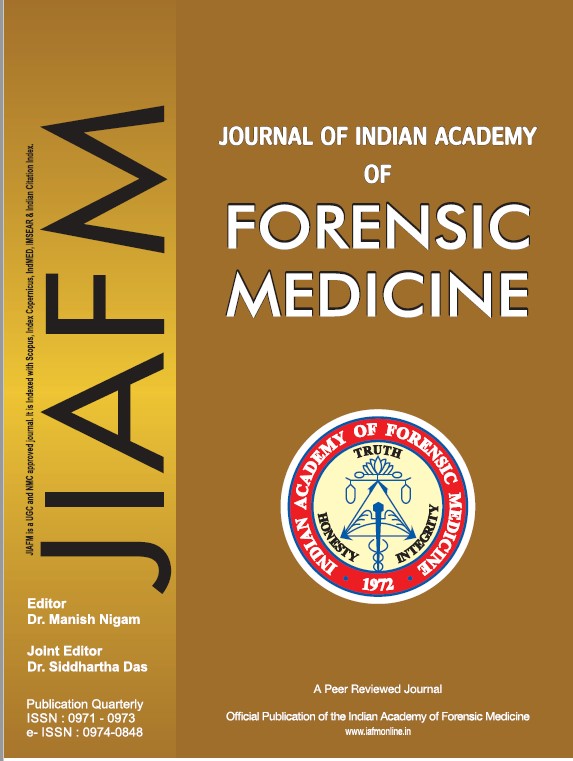Study of Weapons Related to Mechanical Injuries In Fatal Assault Cases Autopsied at Victoria Hospital
DOI:
https://doi.org/10.48165/Keywords:
Weapons, Assault, Assailant, Injuries, Fatal, AutopsyAbstract
Weapons are instruments used with the aim of causing damage or harm to living beings. They are used to increase the efficacy and efficiency of tasks such as in humans fighting, defence, the committing of criminal acts and the preserving of law and order. Weapons are employed individually or collectively either by single assailant or multiple assailants. Commonly knives, daggers, choppers, bamboo sticks are used to inflict injuries. A cross sectional study was conducted in the Department of Forensic Medicine, Victoria Hospital, Bengaluru over a period of 1 year from Jan 2010 to Dec 2010 to highlight the weapons examined related to mechanical injuries in fatal cases of assault autopsied. Single weapon was commonly used in 20 (46.51%) cases of assault. Face (67.44%) was most commonly injured. Sharp heavy weapons like choppers were commonly used in assault cases.
Downloads
References
Bardale R. Principles of forensic medicine and toxicology. New
Delhi: Jaypee Brothers Medical Publishers; 2011. p. 252-4.
Mirza FH, Hasan Q, Memon AA, Adil SE. Audit of sharp weapon
deaths in metropolis of Karachi –An autopsy based study. J Ayub
Med Coll Abbottabad 2010; 22(4):176.
Jagannatha SR, Naveenkumar T, Anand K. Study of homicidal
deaths in south Bangalore. J South Ind. Medico-legal Assoc. 2011
Sep; 3(2):53-5.
Vij A, Menon A, Menezes RG, Kanchan T, Pastogi P. A
retrospective review of homicides in Mangalore, South India. J
Foren Legal Med 2010; 17(6):312-5.
Mohanty MK, Kumar TS, Mohanram A, Palimar V. Victims of
homicidal deaths-an analysis of variables. J Clinc. Forensic Med
; 12:302-4.
Chattopadhyay S, Tripathi C. Skull fracture and haemorrhage
pattern among fatal and nonfatal head injury assault victims- a
critical analysis. J Inj Violence Res 2010 Jun; 2(2):99-103.
Subba SH, Binu VS, Menezes RG, Kumar V, Rana MS. Physical
assault related injuries in Western Nepal- A hospital based
retrospective study. J Forensic Legal Med 2010; 17(4):203-208.
Shivakumar BC, Vishwanath P, Srivastava PC. Trends of
homicidal deaths at a tertiary care centre Bengaluru. JIAFM Apr-
June 2011; 33(2):120-124.
Mohanty S, Mohanty SK, Patnaik KK. Homicide in Southern India.
A five year retrospective study. Forensic Med Anat. Research 2013;
(2):18-24.
Hugar BS, Girish YP, Harish S, Jayanth SH. Pattern of homicidal
deaths. J Indian Acad. Forensic Med 2010; 32(3):194-198.
Oberoi SS, Singh SP, Aggarwal KK, Bhullar DS, Aggarwal A,
Walia DS et al. Profile of fatal assault cases in Patiala. J Punjab
Acad. Forensic Med Toxicol. 2011; 11(2):87-9.
Gupta S, Prajapati P. Homicidal trends at Surat region of Gujarat,
India. J Forensic Med Toxicol. 2009; 26(1):45-8.
Buchade D, Mohite S. Pattern of injuries in homicidal cases in
Greater Munbai: A three year study. JIAFM Jan-March 2001;
(1):46-9.
Rastogi AK, Singh BK, Dadu SK, Thakur PS, Lanjewar AK,
Rajput PP. Trends of homicidal deaths in Indore(MP) region one
year retrospective study. JIAFM Oct-Dec 2013; 35(4):343-5.
Reddy KS. The essentials of forensic medicine and toxicology. 29th
ed. Hyderabad: Medical Book Company; 2009. p. 162,263.


